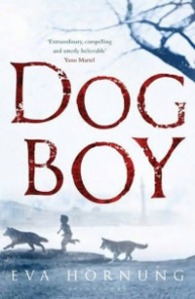Published by Bloomsbury
283pp
Some books are hard to review. Most times because the precise combination of story, style and characterisation makes such an impression that analysis might well turn into panegyric. Dog Boy, by Eva Hornung, is one such book. It was a relief, therefore, to have had something (if slight) to quarrel with at the novel’s end.
But first the synopsis: Romochka, a four-year old Russian boy, is abandoned in an evacuated tenement building by his mother and uncle for reasons that readers never get to know. After a few days of tinkering in the desolate building, hungry and cold, he ventures out into the late autumn. But with his mother’s stringent warnings about dangerous strangers ringing in his ears, he discards ideas of seeking refuge with the neighbours and instead finds himself trailing a female dog.
What follows is Romochka’s wary acceptance into the lair of a clan of dogs, his first meal in days – of milk suckled from Mamochka, as he comes to call the clan matriarch. And three years of weathering season changes, fighting clan battles and surviving militzia raids with his expanding family; as well as of transforming from an inept “puppy” seeking acceptance and worth in the canine family, into a lead dog to be regarded with deference.
What might have from a lesser writer been a suffocating time spent in the hold of the reeking, underground lair becomes in the hands of Hornung a privileged eavesdrop on bizarre experiences and first hand acquaintance with the rituals and psychology of man’s best friend.
And just when the reader begins to get the sense of knowing it all, the writer changes tacks, outraging us along with Romochka when Mamochka unapologetically adopts yet another human child – one that Romochka ironically names ‘Puppy’, a label he never used for his canine siblings. The writer further saves a plot that might have tapered to a dead end by switching points of view much later in the novel, and introducing adult human characters to ease the readers’ approaching canine-weariness, and bring into societal significance the unseen but no less meaningful lives of feral dogs in modern day Moscow.
Romochka is one of the more dynamic characters I have encountered in literature – a hybrid of boy, man and dog, both naïve and world wise; wicked and tender (he kills a human without compunction, yet regrets when he has to butcher a cat for a meal); and is adept at casting himself in any roles as required by present circumstance and the expectation of the city’s human population – one time he’s a dog owner begging for scraps and coercing his “two pretty performers” to shed their wild behaviour while on the job, another time he’s a human sibling demanding to see his younger brother in a civil establishment, other times he morphs into modern day Tarzan wrestling enemy dogs.
One thing Hornung has in her favour is that not many readers, perhaps none, can claim acquaintance with a dog-raised human boy, so we have no recourse but to depend on her imagination, backed no doubt by research, to point us one way or the other. But from this writer, whose experience with dogs is limited to the odd pat, her behavioural depictions ring true. Feral dog owners can insert disagreement here.
Still Dog Boy is as much a critique of society as it is an expose on canine habitation. It illustrates on the one hand, the practiced blindness of Moscow- and indeed most cosmopolitan areas- to its dark underbelly; and on the other, people’s innate doctrinaire ideals and their eagerness to find familiar explanations for confounding observations.
Written in a simple narrative style in the omniscient observer perspective, almost like conversational addresses by a narrator Romochka’s own age, Dog Boy is almost entirely sparing of dialogue – in a way that is unnoticeable as well as understandable (dogs only talk in Disney movies after all). But a few diary entries, chapters introduced with different perspectives and voices, news reports, and human soliloquies employing professional argot break up the monotony of a full on narrative.
Now to my grouse: Despite being abandoned by his human mother, Romockha’s experiences are irrevocably shaped by this elusive character; and it is disappointing that the author declines to expound on why a mother would abandon her child, nor afford the readers closure by introducing her later in the story. Also, while being the consummate obfuscator, Romochka appears slightly more eloquent in human conversation than his limited interaction with people leads us to expect. Even if most of his words are borrowed from fragments of conversation – statements like: “but for some piss, the world is full of shit” or “I can get you a bird… it’s not fucking easy but I can get you a bird” are difficult to attribute to a seven year old who last used language when he was four.
For a novel that defies pigeon-holing in the simple fact of its plot, one of its themes, the one that supports the prejudice that humans, by virtue of proven intelligence, always know what is best for other animal species, is something of a letdown. Nonetheless, it helps that the novel closes with the human characters left uncertain about the rightness of their actions.
First published in The Sun, Nigeria, October 2011

Pingback: Review: Dog Boy | Giraffe Days